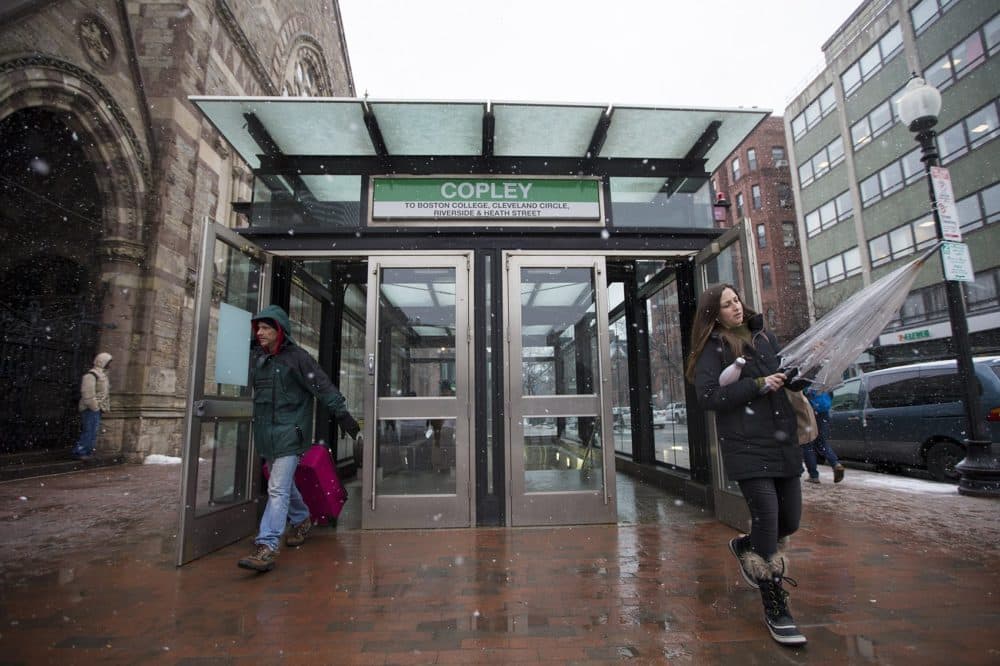Advertisement
Commentary
I Know It’s Cold. But Please Don’t Abandon The MBTA This Winter

Picture this. It’s a subarctic evening in February — black enough to feel like midnight and frigid enough to leave any exposed skin chapped. You’re standing on a corner in Back Bay or Hyde Square. The bus was supposed to arrive 15 minutes ago.
You’ve got three options: catch a Lyft, take shelter in the nearby 7-Eleven and risk missing the bus, or remain outside in the cold, shivering, cursing and wondering when (or if) the MBTA will ever come.
If you’ve spent any time in the Boston area over the last 20 years, chances are you’ve lived this.
Winter can be an ethereal and meditative season. But if you rely on public transportation to get around the city, the iciest months carry an air of dread. All those years of public disinvestment in the MBTA have been manifesting regularly (see this summer’s train derailments), but winter is when the transit breakdowns and delays get arduous.
Slushy roads, frozen rails and subfreezing temperatures wreak havoc on our aging infrastructure. For commuters, it means longer waits for trains and buses, a higher chance of equipment failure and unquantifiable frustration.
Bearing all of this in mind, it might seem intuitive to avoid the MBTA this winter — to rideshare, to buy a car or just avoid going out much. These alternatives offer a bit of convenience in the short term, and for Greater Boston residents who’ve weathered way too many MBTA snafus, short term convenience could be enough to walk away from public transit. But this year, as a Boston resident who rides the MBTA daily, I’d like to make a big ask of everybody approaching this season with anxiety and pre-emptive commuting fatigue: Please, don’t abandon public transit this winter.
I don’t request this lightly. One of the most painful wrinkles of dealing with a broken, malnourished transit system is that it can literally cost us. MBTA delays routinely make us late for work, school and other obligations. A broken transit system also poses considerable safety hazards to commuters during the winter, when exposure to the elements is a danger (though it’s not exactly safe in the warmer seasons, either). You really don’t want to be on a train when the gear malfunctions or in a bus shelter during the Polar Vortex.
Advertisement
But fleeing public transit during the winter hurts Boston even more.
First, any public transit exodus puts more cars on the road during a time of the year when driving conditions in New England can be quite dangerous. (Especially in a state like Massachusetts, where we drive as though auditioning for George Miller’s next “Mad Max” sequel.) It further normalizes driving and car culture at a time when we should be focusing on public transit as a pillar of urban living. According to a new series by the Boston Globe, “Seeing Red,” of Boston’s 2.6 million commuters, 66% drive alone to work — that’s horrific. This will become even more relevant in the decades ahead, as climate change grows worse and as it intensifies our “normal” winter weather.
But maybe the most destructive consequence of a wintertime public transit exodus is how it encourages people to give up on the idea of better public transportation.
I recently reported a story that involved riding RTA buses and trains across the state, to gauge the availability of public transit. At one point, I spoke with Boston City Councilor and public transit advocate Michelle Wu. During this conversation, she mentioned a transportation study that her office had conducted with Boston area students. When asked about their thoughts on the MBTA, Wu explained that most of the students wanted to drive, and that by letting public transit wither, the state is simply fomenting “this disgust in the system.”
Transit riders here in Boston are rightly furious about the sad state of the MBTA. But that fury is a powerful force that could be used to catalyze change at a legislative level. We could fund system improvements with tax reforms that would mostly affect the wealthiest state households (such as the Fair Share Amendment that Gov. Charlie Baker has tried to derail). We could raise the state gas tax for the first time in over a decade (a move supported by municipal leaders across greater Boston). We could put more municipal leaders onto MBTA’s oversight board, as Wu wants to do. And hey, at a certain point, we could make the MBTA free. You know ... to incentivize transit ridership!
The most destructive consequence of a wintertime public transit exodus is how it encourages people to give up on the idea of better public transportation.
Leaving the MBTA behind this winter, and possibly for good, might alleviate some of your stress. But it will feed into Boston’s mounting transit crisis. Sometimes, it’s healthier to stay angry and come together with a determination to fix problems that are exhausting us.
Whether that fix is voting for transit-friendly politicians next year or encouraging more of your colleagues to take the MBTA (especially on nights when your friend says “Let’s get an Uber,” and there’s an MBTA station right there) this winter is the time to commit to public transit. It won’t be easy. It will drive you mad. But it’s vital.
And if more of us do this, we will get somewhere, eventually.
